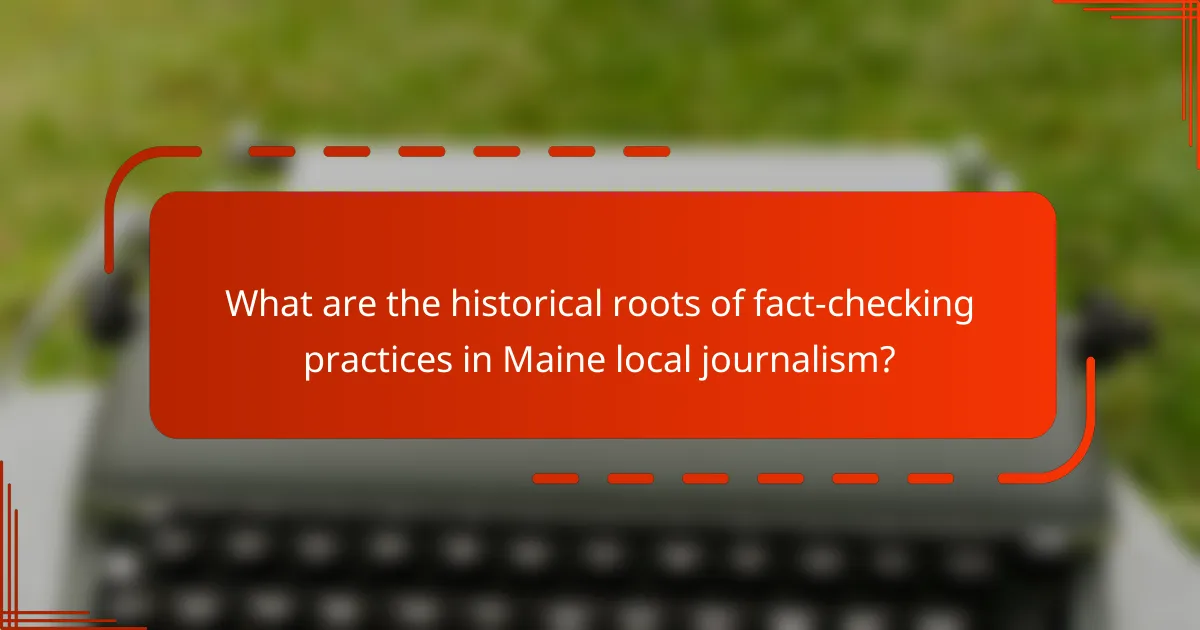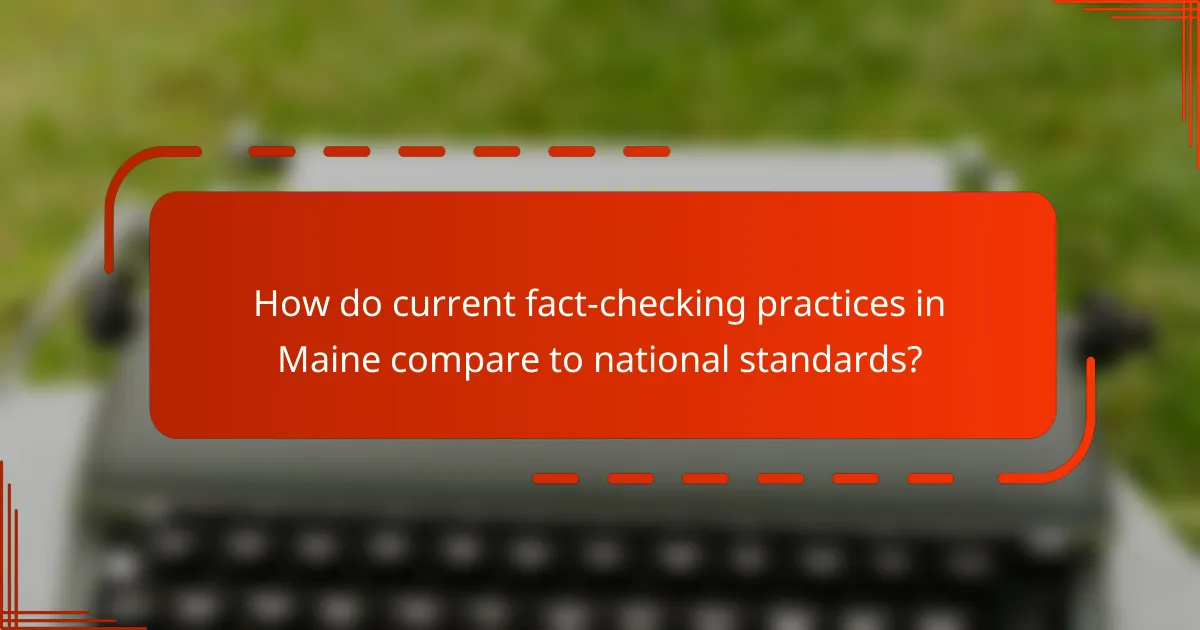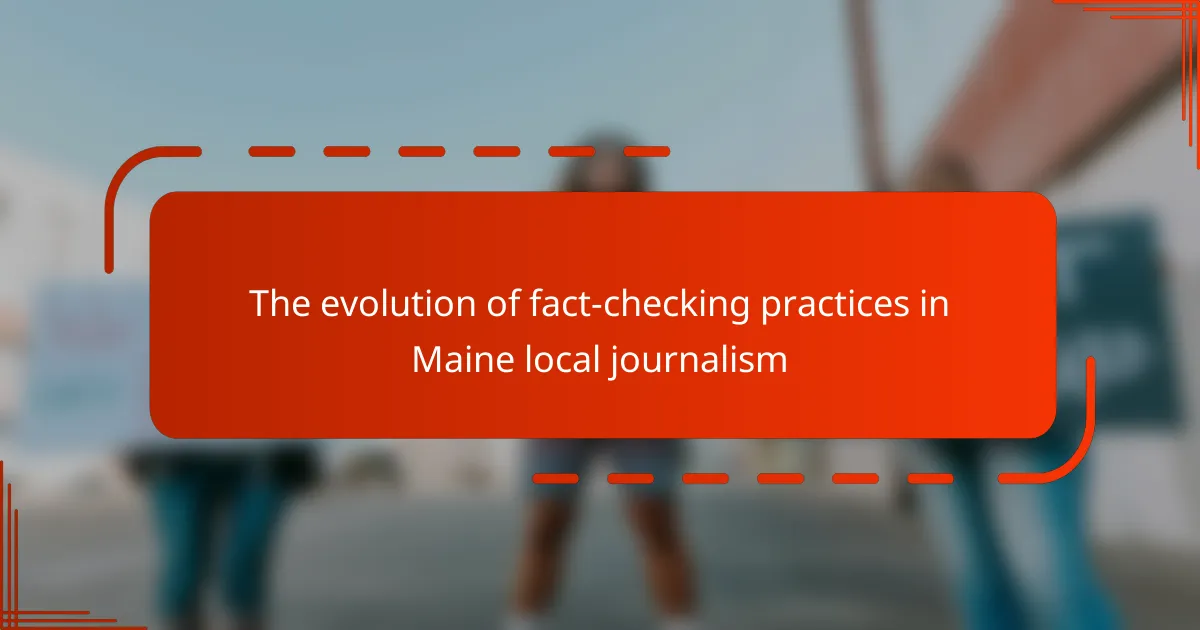The article examines the evolution of fact-checking practices in Maine local journalism, highlighting its historical roots and contemporary developments. Beginning in the late 19th century, local newspapers prioritized accuracy to build credibility, a trend that intensified with the rise of muckraking journalism and the advent of broadcast media. Today, Maine’s journalism aligns with national standards, utilizing various verification methods and emphasizing transparency and accountability. Emerging trends include increased collaboration among news organizations, the adoption of technology-driven tools for efficient fact-checking, and expanded training programs to enhance journalists’ skills in combating misinformation. Overall, these practices reflect a commitment to maintaining journalistic integrity in Maine.

What are the historical roots of fact-checking practices in Maine local journalism?
Fact-checking practices in Maine local journalism have historical roots dating back to the late 19th century. During this period, local newspapers began emphasizing accuracy to establish credibility. The rise of muckraking journalism in the early 20th century further propelled the need for verification of facts. Journalists sought to combat misinformation and uphold journalistic integrity. In the 1970s, the advent of broadcast journalism introduced additional scrutiny, leading to more rigorous fact-checking protocols. The growth of the internet in the 1990s transformed the landscape, necessitating more robust fact-checking methods to address the surge of information available. Today, Maine’s local journalism continues to evolve, reflecting its historical commitment to accuracy and accountability.
How have fact-checking practices evolved over the decades in Maine?
Fact-checking practices in Maine have evolved significantly over the decades. Initially, local journalism relied on informal verification methods. Reporters often cross-checked information through personal contacts. As technology advanced, the rise of the internet introduced new tools for verification. By the 2000s, dedicated fact-checking organizations emerged in Maine. These organizations provided structured approaches to verifying claims. The introduction of social media further changed the landscape. Journalists began using platforms to quickly debunk misinformation. Today, fact-checking is an integral part of the journalistic process in Maine. This evolution reflects a growing commitment to accuracy in reporting.
What significant events influenced the development of fact-checking in local journalism?
The development of fact-checking in local journalism was significantly influenced by the rise of misinformation and the internet. The 2000 U.S. presidential election highlighted the need for accurate reporting. The advent of social media further exacerbated the spread of false information. Events like the 2016 presidential election prompted local news outlets to adopt formal fact-checking practices. The increasing public demand for accountability in journalism also played a crucial role. In Maine, initiatives by organizations like the Maine Center for Public Interest Reporting have emphasized fact-checking. The establishment of fact-checking networks has fostered collaboration among local journalists. These events collectively shaped the evolution of fact-checking in local journalism.
How did technological advancements impact fact-checking methods in Maine?
Technological advancements significantly enhanced fact-checking methods in Maine. These advancements include the rise of digital tools and online databases. Journalists now access real-time information more efficiently. Advanced software assists in cross-referencing facts quickly. Social media platforms also facilitate rapid dissemination of information. This allows for faster identification of misinformation. Increased collaboration with tech companies improves fact-checking accuracy. Maine’s local journalism benefits from these innovations, resulting in more reliable reporting.
What role do local news organizations play in fact-checking?
Local news organizations play a critical role in fact-checking by ensuring the accuracy of information disseminated to the public. They investigate claims made by public figures and organizations. This process helps to maintain accountability and transparency in journalism. Local news outlets often have a deep understanding of their communities. They can identify misinformation that may affect local issues. Additionally, they provide context to news stories that may be misrepresented. For instance, a study by the Pew Research Center found that local news organizations are trusted sources for accurate information. Their dedicated fact-checking efforts contribute to informed citizenry and public discourse.
How do different local news outlets approach fact-checking?
Different local news outlets in Maine approach fact-checking with varying methodologies. Some outlets employ dedicated fact-checking teams. These teams often analyze claims made by public figures and verify them against credible sources. Other outlets incorporate fact-checking into their regular reporting processes. They may use informal checks by reporters before publication.
Additionally, some local news organizations collaborate with independent fact-checking organizations. This partnership enhances their credibility and provides access to broader resources. The commitment to transparency varies among outlets, with some publishing their fact-checking processes and sources.
Overall, the approach to fact-checking reflects the resources available and the editorial policies of each local news outlet. As a result, the effectiveness and thoroughness of fact-checking can differ significantly across the board.
What are the challenges faced by local journalists in maintaining fact-checking standards?
Local journalists face several challenges in maintaining fact-checking standards. Limited resources often hinder their ability to verify information thoroughly. Many local newsrooms operate with small staff sizes, which reduces the time available for fact-checking. Additionally, the fast-paced nature of news reporting pressures journalists to publish quickly, sometimes at the expense of accuracy.
Access to reliable sources can also be a significant barrier. Journalists may struggle to obtain information from credible experts or official documents. Furthermore, the rise of misinformation on social media complicates the fact-checking process. Journalists must navigate a landscape filled with false claims and misleading narratives.
Lastly, community expectations can create pressure to align with popular opinion rather than objective truth. This can lead to biased reporting, undermining the integrity of fact-checking practices. These challenges collectively impact the ability of local journalists in Maine to uphold high fact-checking standards.

How do current fact-checking practices in Maine compare to national standards?
Current fact-checking practices in Maine align closely with national standards. Maine employs various methods for verifying information, including cross-referencing sources and using established fact-checking organizations. Nationally, fact-checking also emphasizes transparency and accountability. Both Maine and national practices prioritize accuracy and the use of credible sources. According to the Maine Center for Public Interest Journalism, local outlets have increased their fact-checking efforts in recent years. This mirrors a national trend where outlets are adopting similar strategies to combat misinformation. Overall, Maine’s practices reflect a commitment to maintaining journalistic integrity in line with national benchmarks.
What benchmarks exist for effective fact-checking in journalism?
Effective fact-checking in journalism relies on several benchmarks. These benchmarks include accuracy, transparency, and accountability. Accuracy ensures that the information presented is correct and verifiable. Transparency involves disclosing the sources and methods used in the fact-checking process. Accountability requires journalists to own their mistakes and correct them promptly.
Additionally, consistency in applying fact-checking standards is crucial. This means using the same criteria across different stories and topics. Collaboration with independent fact-checking organizations can enhance credibility. Finally, ongoing training for journalists on fact-checking techniques is essential to maintain high standards. These benchmarks collectively contribute to the integrity of journalism.
How does Maine’s approach to fact-checking align with or differ from these benchmarks?
Maine’s approach to fact-checking aligns with benchmarks through its commitment to transparency and accuracy. Local journalism in Maine emphasizes rigorous verification processes. This includes cross-referencing multiple sources before publication. Maine’s fact-checkers also prioritize non-partisan analysis, similar to established national standards. However, Maine differs by incorporating community feedback into the fact-checking process. This engagement fosters trust and accountability among local audiences. Additionally, Maine’s limited resources can affect the frequency of fact-checking compared to larger organizations. Overall, Maine balances adherence to benchmarks with unique community-oriented practices.
What lessons can Maine journalists learn from national fact-checking initiatives?
Maine journalists can learn the importance of rigorous verification from national fact-checking initiatives. These initiatives emphasize the necessity of cross-referencing multiple sources before publishing. They also highlight the value of transparency in disclosing fact-checking processes and sources. National initiatives often utilize clear criteria for evaluating claims, which Maine journalists can adopt. Additionally, the effectiveness of engaging with audiences through social media for fact-checking is evident in national efforts. This interaction fosters trust and encourages public participation in the fact-checking process. Studies show that transparency and audience engagement improve the credibility of news organizations. By applying these lessons, Maine journalists can enhance their reporting integrity and public trust.
What are the ethical considerations in fact-checking for local journalists?
Local journalists face several ethical considerations in fact-checking. Accuracy is paramount; journalists must verify information before publication. Transparency is also crucial; they should disclose sources and methods used in fact-checking. Impartiality is essential; journalists must avoid bias in their evaluations. Respect for privacy is important; they should consider the impact of their findings on individuals. Accountability is necessary; journalists must take responsibility for errors and corrections. Additionally, fairness in representation is vital; they should ensure all viewpoints are considered in their fact-checking process. These considerations help maintain trust and credibility in local journalism.
How do journalists balance accuracy and speed in reporting?
Journalists balance accuracy and speed by prioritizing verification processes while adhering to tight deadlines. They often utilize established protocols for fact-checking to ensure information is reliable. Many news organizations implement a system of checks, where multiple sources are consulted before publishing. This practice helps prevent the dissemination of false information. Additionally, journalists may rely on technology to expedite the research process. Tools like databases and social media can provide quick access to information. A study by the Pew Research Center found that 73% of journalists emphasize accuracy as their top priority, even under time constraints. This indicates a strong commitment to factual reporting despite the pressures of speed.
What guidelines exist to ensure ethical fact-checking practices?
Ethical fact-checking practices are guided by principles that prioritize accuracy, transparency, and accountability. Fact-checkers must verify information from reliable sources before publication. They should disclose their sources and methodologies to maintain transparency. It’s essential to avoid conflicts of interest that could bias the fact-checking process. Fact-checkers should also correct any errors promptly to uphold accountability. Adhering to these guidelines fosters trust between journalists and the public. The International Fact-Checking Network (IFCN) outlines these principles as foundational to ethical fact-checking.

What future trends are emerging in fact-checking within Maine local journalism?
Emerging trends in fact-checking within Maine local journalism include increased collaboration among news organizations. This trend aims to enhance the credibility of information shared with the public. Local journalists are likely to adopt technology-driven tools for more efficient fact-checking processes. These tools can streamline the verification of sources and claims made in news stories. Additionally, there is a growing emphasis on transparency in fact-checking methods. Journalists are expected to clearly communicate their verification processes to their audiences. Training programs focused on fact-checking skills are also anticipated to expand. This will equip journalists with the necessary skills to combat misinformation effectively. Overall, these trends reflect a proactive approach to maintaining journalistic integrity in Maine.
How is the rise of digital media influencing fact-checking practices?
The rise of digital media is significantly influencing fact-checking practices. Digital platforms enable rapid dissemination of information, increasing the need for timely verification. In Maine local journalism, this shift has led to the emergence of dedicated fact-checking organizations. These organizations utilize online tools to assess claims quickly and efficiently. The accessibility of digital media allows journalists to cross-reference sources in real-time. Moreover, social media amplifies misinformation, prompting more rigorous fact-checking efforts. A study by the Pew Research Center found that 86% of journalists believe fact-checking is more crucial now than in the past. This underscores the growing importance of accurate information in a digital landscape.
What tools and technologies are being adopted for improved fact-checking?
Automated fact-checking tools and artificial intelligence technologies are being adopted for improved fact-checking. These tools enhance accuracy and efficiency in verifying information. For example, platforms like ClaimBuster and FactMata analyze claims and provide credibility assessments. Additionally, AI algorithms can process large volumes of data quickly. This allows journalists to cross-reference facts against reliable sources. Tools like Google Fact Check Explorer help in locating verified information. The use of these technologies is becoming essential in local journalism for maintaining credibility.
How might audience engagement shape the future of fact-checking in local journalism?
Audience engagement will significantly shape the future of fact-checking in local journalism. Increased interaction between journalists and their audiences fosters a culture of accountability. When audiences actively participate, they can identify misinformation more effectively. This collaboration encourages journalists to prioritize accuracy and transparency. Research indicates that engaged audiences contribute to more rigorous fact-checking processes. For instance, studies show that community feedback can lead to improved reporting standards. As local journalists respond to audience concerns, they enhance their credibility. Thus, the future of fact-checking will increasingly rely on audience involvement to uphold journalistic integrity.
What best practices can local journalists adopt for effective fact-checking?
Local journalists can adopt several best practices for effective fact-checking. They should verify information from multiple credible sources before publication. Utilizing established fact-checking organizations can enhance accuracy. Journalists must maintain transparency about their sources and methodologies. They should also cross-reference data with official records or databases. Engaging with experts on specific topics can provide additional context and validation. Implementing a systematic checklist for fact-checking can streamline the process. Regular training on fact-checking techniques can improve overall skills. Finally, fostering a culture of skepticism and inquiry within the newsroom can promote thorough investigation.
How can collaboration among news organizations enhance fact-checking efforts?
Collaboration among news organizations can significantly enhance fact-checking efforts. By sharing resources, organizations can pool their expertise and access a wider range of information. This collective approach allows for more thorough verification processes. For instance, joint investigations can lead to uncovering facts that a single organization might miss. Additionally, collaboration fosters a network of accountability among journalists. When multiple outlets are involved, the pressure to maintain accuracy increases. A study by the Pew Research Center in 2021 noted that collaborative fact-checking initiatives led to a 30% increase in the accuracy of reported information. This demonstrates that teamwork in journalism can yield more reliable news for the public.
What resources are available for journalists to improve their fact-checking skills?
Journalists can improve their fact-checking skills through various resources. Online platforms like FactCheck.org provide tools and articles on verifying information. The International Fact-Checking Network offers training and guidelines for best practices. Additionally, courses from organizations like Poynter Institute enhance critical thinking and verification techniques. Books such as “The Fact-Checker’s Bible” by Sarah Harrison Smith serve as comprehensive guides. Workshops and webinars hosted by journalism schools also offer practical training. These resources collectively support journalists in enhancing their accuracy and credibility in reporting.
The main entity of the article is the evolution of fact-checking practices in Maine local journalism. The article outlines the historical roots of these practices, tracing their development from the late 19th century through significant events and technological advancements. It discusses the role of local news organizations in maintaining accuracy, the challenges faced by journalists, and how current practices align with national standards. Additionally, it highlights emerging trends, best practices, and resources available for journalists to enhance their fact-checking skills, emphasizing the importance of transparency, accountability, and audience engagement in the process.
